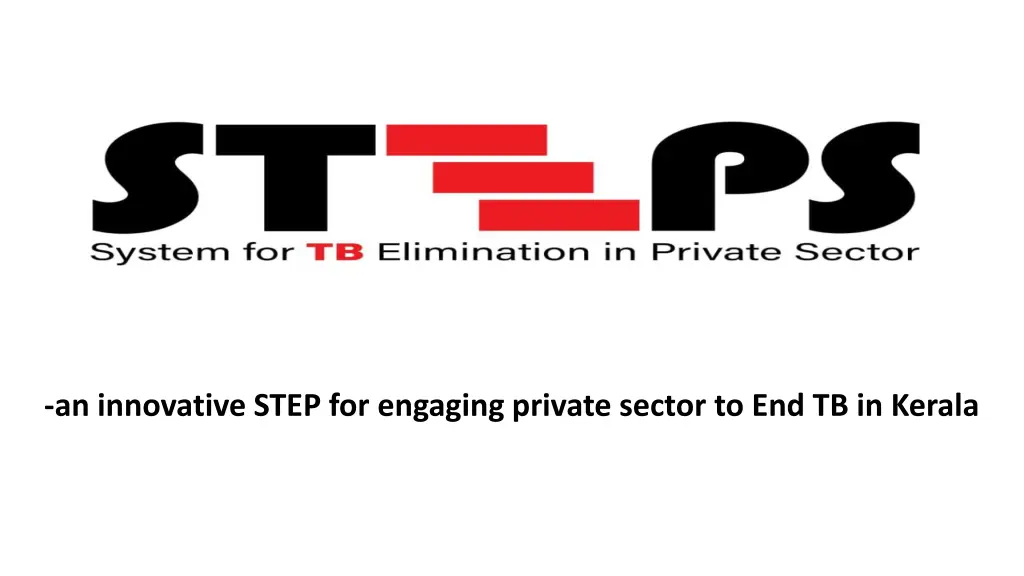
Innovative Strategy for Private Sector Engagement in Ending TB in Kerala
"Learn about an innovative approach to engaging the private sector in Kerala to end TB by 2025. The initiative aims to address leaks in TB care cascade, improve success rates, and ensure all patients receive proper care. Explore how a single-window system, STEPS centers, and consortium collaborations are driving this groundbreaking effort."
Download Presentation

Please find below an Image/Link to download the presentation.
The content on the website is provided AS IS for your information and personal use only. It may not be sold, licensed, or shared on other websites without obtaining consent from the author. If you encounter any issues during the download, it is possible that the publisher has removed the file from their server.
You are allowed to download the files provided on this website for personal or commercial use, subject to the condition that they are used lawfully. All files are the property of their respective owners.
The content on the website is provided AS IS for your information and personal use only. It may not be sold, licensed, or shared on other websites without obtaining consent from the author.
E N D
Presentation Transcript
-an innovative STEP for engaging private sector to End TB in Kerala
Background Approximately half of the TB patients in India seek care from private sector. Concerted efforts by the National TB Program are going on to get all these cases notified. Leaks in TB care cascade were identified in the country. Standards of TB Care in India envisions all patients to receive 26 standards irrespective of place of treatment Kerala Government has declared its commitment to End TB by 2025 and envisions Public and Private to work together for the benefit of the society.
Among the patients initiated on private regimen, the success rate was 70.4% among PTB and 76.1% among EPTB cases. The leak in cascade of care was identified as a major issue in private hospitals as there was no system there to identify the leaks, follow up the patient and ensure public health actions. Details for 21% patients undergoing a private anti- tuberculosis regimen could not be obtained and were considered as Lost to Follow Up
S System for ystem for TB TB E Elimination in limination in P Private rivate S Sector ector Single window system in private hospital Ensuring all Public Health Actions to all STEPS centres Consortium of Hospital Managements Establishing STEPS, policy support & Review Private Hospital Consortium To sensitise and support specialists To advocate with doctors for following STCI Coalition of Professional Medical Association
STEPS Centre Model A nodal person (STEPS lead) at the centre and contact persons (STEPS link) in each in-house unit are linked in a hub and spoke model. Patients are counselled and supported during test, diagnosis, treatment initiation and ensuring all public health actions. STEPS Lead notifies cases to Nikshay and update information. Specimen collection and transportation for cost-free CBNAAT test, Anti-tuberculosis drugs, domestic Airborne infection control kits, patient incentives and ICT based treatment monitoring are provided by RNTCP at the private hospital.
Private Sector Cases- Comparison between 2018 and 2019 2018 (JAN-SEP) 2019 (JAN-SEP) Remarks Notification (Enrolment/Diagnosis at a private facility) 3829 5040 31% increase in private Notification as compared to 2018 Microbiological Confirmation 35% 40% Universal DST 16% 39% DBT Account Entry 51% 66% HIV Status 42% 70%
Trend of Adult Rifampicin containing Products Sales (2015-2018) 2500000 2033010 2000000 1844320 1667190 1500000 1000000 500000 511570 0 Y2015 Y2016 Y2017 Y2018 Data Source: Annual TB drug Sales Information of Lupin, Cadila, Concept, Macleods officially collected by Drugs Controller of Kerala as part of TB surveillance
Sustainability, Scalability, Replicability The model has no additional financial or human resource implications. It fosters customer loyalty between patient and private hospital without interfering in business. So, itself it is sustainable. It relies on social responsibility of private sector blended with profitable customer care services and self realisation of the Government about its actual role to serve the entire citizens. The model could be locally customised to any setting. It is a win-win-win scenario for Public, Private and Society, so itself easily replicable.
Conclusion Conclusion Low cost locally customised private sector engagement models with good administrative commitment is feasible and is beneficial to the society. STEPS is a patient centric strategy by Government which helped to (i) Improve Standards of Care among patients reaching private sector, (ii)Reduce Out of Pocket Expenditure to patients reaching private & (iii) Strengthen the system to ensure Universal access to TB care. STEPS will also lead the way for establishing System for Total Engagement of Private Sector for all National Health Programs other than TB.
